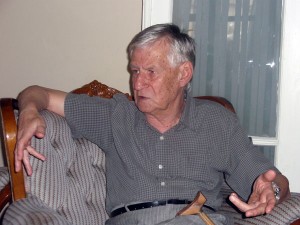“LOVE THE SOLDIER”
An interview with prose writer and dramaturg Pertch Zeytuntsyan.
 -Mr. Zeytuntsyan in the frames of our conversation I would like to talk about your roots, the way you lived and your literary heritage, as well as about modern Armenian prose and urgent problems of modern literature. How would you like to begin our conversation?
-Mr. Zeytuntsyan in the frames of our conversation I would like to talk about your roots, the way you lived and your literary heritage, as well as about modern Armenian prose and urgent problems of modern literature. How would you like to begin our conversation?
-Lets begin, evidently, from my surname. My ancestor’s surname is Ter-Sargsyan, but of honour to my grandfather, known by name Sargis Zeytuntsi, our clan began to be called by surname Zeytuntsyan. Fortunately, my clan managed to escape the massacre and settle in Egypt, where I was born. Egyptian-Armenian colony was united, organized and active. The urgent problem of our diaspora was the observance of our roots and national character. It’s not by chance, that the Egyptian-Armenian colony is glorified with such names, as Mihran Yerkat, Zaven Dolabjyan, Hakob Hakobyan and Ann Nshanyan. In local Armenian schools children were brought up with national value.
-Your works have been translated in 12 languages. They tell the world about our pain and gladness, losses and hopes, about our fate-about Armenians. Your “Great sunrise” play was published in 80 thousand copies and your ”Great silence” play stayed on the stage of Yerevan Dramatic Theatre named by G. Kaplanyan for 27 years. I must point with regret, that such, obtaining international recognition don’t come across very often. These are the works that can carry our national problems on global level, combining the timely and the eternal.
-I suppose, that national problems and national theme can’t but have global sources, can’t but cause concern to people and can’t but touch upon the perpetual challenges of history. Often we confuse the national, narrow, personal and conjunctional problems. The problem leads to the philosophy of national questions, to the ability to value them from the aspect of global response and global emphasis, as well as it leads to striving to look at world problems through the prism of national problems. The national is manifested in the context of world-perception and meditation, aesthetics and morality. The base of all the global values is deeply national.
-The representative of each nation, regardless of the way of living, history and culture can’t be indifferent to the tragedy of the man, who has lost his fatherland. “The great silence” – Varujan, Sevak and Komitas have caused and will cause us anxiety.
-Lincoln has given a brilliant definition. “If I you talk the truth, then the republic will be saved”. The mission of the art worker is to tell the truth. The representative of the world art must be honest with people and he mustn’t adapt. Even if only once you tell the half-truth, people will turn away from you, they will not trust you.
-What does today’s Armenian prose endure? What has Armenian literature inherited from our epoch, particularly, from our recent history with its struggle and victories.
-I can mention a few names- Gurgen Khandjyan, Vahagn Grigoryan, Norayr Adalyan, Ruben Hovsepyan, Vahagn Mughnetsyan. Recently a splendid young novelist Areg Azatyan, who was awarded with a national reward appeared in the literary scene. Our time-ascents and descents, our spirit and the character of the Armenian man find their personification in the Armenian prose and today we have good works. The problem is that they don’t reach people. Literature- it’s a dialogue between the writer and the reader. Those dialogues don’t exist, so literature doesn’t carry out its mission- there is no contact between the writer and the reader.
-Mr. Zeytuntsyan, recently we were celebrating the regular anniversary of the independence of Artsakh. What does that jubilee symbolize for you?
-The victory of Artsakh- is the victory of each one of us. In the end of the 20-th century, after centuries’ intermission we gained a real victory. It’s the victory of weapon, victory of spirit, which besides power and strength, belief and inflexible will, represents a perceptible acquisition- an independent homeland and native country. During 20 years we managed to keep our military achievements unbending. It’s also a great triumph, which once more affirms that independence is an irreversible fact. I wish new victories to the people of Artsakh and the Armenians all over the world.
GAYANE POGHOSYAN
Category: Army and Society, Spiritual-Cultural, News










